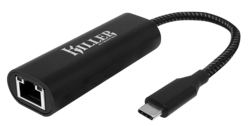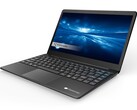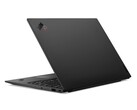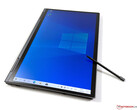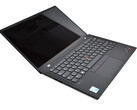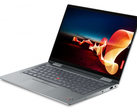Lenovo ThinkPad X1 Carbon Gen 9 Laptop Review: Big 16:10 upgrade with Intel Tiger Lake
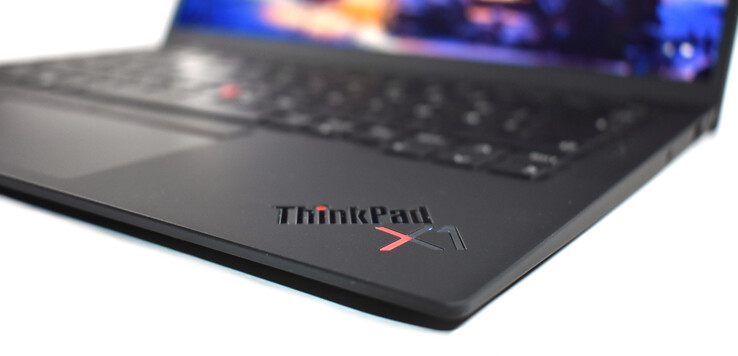
Back in the year 2012 when Lenovo released the ThinkPad X1 Carbon for the first time, it was not certain that there would be an X1 Carbon Gen 9 nine years later. Since May 2012, the Lenovo ThinkPad X1 Carbon is the flagship model of the ThinkPad series. Lenovo has mostly opted for an evolutionary approach, apart from the X1 Carbon Gen 2 with its experimental keyboard. The last really impactful update happened in 2017 with the X1 Carbon Gen 5 and the move to a smaller footprint. The 2019 ThinkPad X1 Carbon Gen 7 introduced a better speaker system, but otherwise, this design was just a small update.
With this in mind, the new Lenovo ThinkPad X1 Carbon Gen 9 is one of the biggest updates of the series. Lenovo makes many changes, in the inside and on the outside. These alterations go hand in hand with the update to Intel Tiger Lake. Today's review unit contains a Intel Core i7-1165G7, 32 GB RAM, a 1 TB NVMe PCIe 4.0 SSD and a 4K-UHD+/WQUXGA LCD.
possible competitors for the comparison
Rating | Date | Model | Weight | Height | Size | Resolution | Price |
|---|---|---|---|---|---|---|---|
| 90.3 % v7 (old) | 05 / 2021 | Lenovo ThinkPad X1 Carbon G9-20XWCTO1WW i7-1165G7, Iris Xe G7 96EUs | 1.2 kg | 14.9 mm | 14.00" | 3840x2400 | |
| 90.2 % v7 (old) | 07 / 2020 | Lenovo ThinkPad X1 Carbon 2020-20UAS04T00 i7-10510U, UHD Graphics 620 | 1.1 kg | 14.9 mm | 14.00" | 1920x1080 | |
| 88.9 % v7 (old) | 07 / 2020 | Dell Latitude 7410 i7-10610U, UHD Graphics 620 | 1.4 kg | 19.3 mm | 14.00" | 3840x2160 | |
| 90.6 % v7 (old) | 03 / 2021 | HP EliteBook x360 1040 G7, i7-10810U i7-10810U, UHD Graphics 620 | 1.4 kg | 16.5 mm | 14.00" | 1920x1080 | |
| 91.1 % v7 (old) | 12 / 2020 | Apple MacBook Pro 13 Late 2020 M1 Entry (8 / 256 GB) M1, M1 8-Core GPU | 1.4 kg | 15.6 mm | 13.30" | 2560x1600 |
Chassis: A ThinkPad laptop with a hump
Some basic ThinkPad design attributes of the X1 Carbon remain untouched - the black chassis color, the wedge-shaped base and of course, the red ThinkPad TrackPoint. With the lid closed, a difference to the ThinkPad X1 Carbon Gen 8 is apparent: The lid has a barely visible hump. This is due to the change to 16:10 screens. There is not enough room for the LCD controller beneath the screen, so it is placed behind the panel. Apart from this subtle difference, most changes happen in the palmrest area: The two upward-firing speakers are moved to the side of the keyboard, while the power button is now placed above the keyboard. Also, the new hinge design is reminiscent of the ThinkPad X1 Extreme. New is the X1 logo on the palmrest - a bit too on the nose for us, though it is certainly a matter of taste.
Despite the print on the bottom that says "Carbon + Magnesium Chassis", the bottom plate is made out of aluminum, with a carbon screen cover and a magnesium palmrest. The materials are hidden from the user though, as the entirety of the X1 Carbon is covered under a rubberized layer of black paint. In terms of stability, the material-mix is excellent. The LCD panel is shielded from pressure well by the carbon fiber cover, and the keyboard cover can barely be depressed in the middle by exerting a lot of pressure. Overall, the base is pretty stiff, while the thin LCD cover is naturally more flexible. The X1 Carbon Gen 9 exhibits no build quality issues and the black coating feels very nice to the touch - though it still is susceptible to fat stains.
The wide one-bar hinge allows for an opening angle of more than 180 degrees. The screen can be opened with one finger and the hinges hold the screen securely without any wiggling.
Unusual for an X1 Carbon: The ThinkPad X1 Carbon 2021 is actually heavier than the preceding model. The difference is small, but so far, the new X1 Carbon was usually lighter than the older model. Maybe this has something to do with the release of the ThinkPad X1 Nano, which is even lighter. Compared with the competitors, the X1 Carbon is still noticeably lighter.
With the change to 16:10 screens, the width of the chassis is reduced. On the other hand, the X1 Carbon G9 is slightly longer. The much smaller screen bezel beneath the screen does look much more modern.
Connectivity: Lenovo PC keeps USB A and HDMI
Lenovo only makes small changes to the port selection. This is not a bad thing in the year 2021, as USB A ports and HDMI are kept around. New are the Thunderbolt 4 instead of the Thunderbolt 3 ports. Also, the mechanical side-docking port/miniEthernet port is removed. Lenovo still refuses to put a SD card reader into the X1 Carbon.
Communication
Lenovo still uses the Intel Wireless AX201 in the ThinkPad X1 Carbon 2021. This is a very powerful 2x2-AX solution, but not the state of the art anymore - that would be the Intel Wireless AX210.
Buyers can get state of the art when it comes to WWAN, as both 5G and 4G cards are available. Our review sample contains neither.
Killer USB-C Ethernet Adapter - Upgrade to a stable connection
Despite advances in wireless networking, Ethernet is still the top choice for gamers and power users. The Killer 2.5G Ethernet to USB-C Adapter enables seamless Ethernet connectivity with full 2.5 Gbps throughput. It also brings the best of Killer technologies including the much acclaimed Killer Prioritization Engine, GameFast, Extreme Mode, and Intelligence Engine that ensure your favorite game or app gets the bandwidth and priority it deserves. For laptops already equipped with a Killer wireless card, Killer DoubleShot Pro offers bandwidth doubling and fine-grained control over network packets passing through each connection.
In our testing, the Killer 2.5G Ethernet Adapter lived up to the advertised speeds consistently throughout testing. You can read more about performance comparison with other USB Ethernet Adapters in our article.
The Killer 2.5G Ethernet to USB-C adapter can be purchased on Amazon for US$ 49.99
Webcam
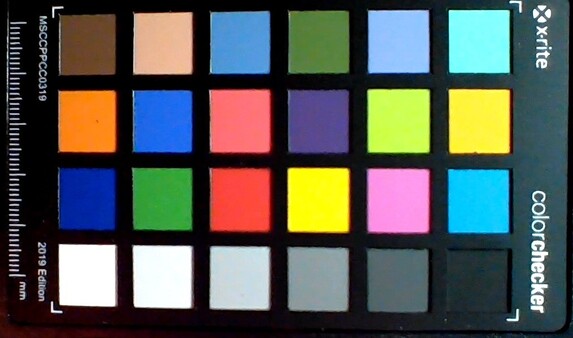
Security
A smartcard reader would be a welcome addition to a business laptop like the X1 Carbon Gen 9. Other than that, it does offer pretty much all the security features you would want - an Infrared camera, fingerprint reader (integrated into the power button), Human Presence Detection, a Kensington Lock and a ThinkShutter. Optional is the ePrivacy screen, which is not present in out review device.
Accessories
Apart from the 65 W charger, there are no additional accessories included in the box.
Maintenance
The chassis of the ThinkPad X1 Carbon Gen 9 is easy to open. The bottom cover is held in place by five captive Phillips head screws, as well as a few clips at the back and sides of the chassis. They are easily released, as is the base plate.
There is not much to do on the inside. Only the SSD is upgradable, Wi-Fi and RAM are soldered down, WWAN is not prepared. The battery is replaceable and users can clean the fans. The USB C ports are soldered on the motherboard, which has to be changed in case of mechanical damage. The keyboard is also not easily exchangeable. The LCD panel can only be replaced as one unit with the hinges and the LCD cover, too.
Warranty
Ex-factory, the X1 Carbon can either have 12 or 36 months carry-in warranty - in this case, it has 36 months (12 months for the battery). Warranty upgrades like a 5 year warranty, on-site service, a longer battery warranty or accidental damage protection cost extra.
Input devices: Keyboard is compared with the ThinkPad X1 Carbon 2020
Keyboard
One of the most important attributes of every ThinkPad laptop is the keyboard. The one in this Lenovo ThinkPad X1 Carbon Gen 9 is made by Chicony and it is a good keyboard: The slightly concave backlit Chiclet keys offer an enjoyable typing feel. However, the keyboard is worse compared with the X1 Carbon Gen 8. Typing feel is a bit lighter. The key travel is the same (1.5 mm), but the key caps are visibly less tall. Lenovo also touched up the keyboard width, the whole keyboard measured roughly 27.5 cm horizontally instead of 29 cm. Overall, the keyboard quality is still on a high level, but no ThinkPad X1 Carbon has had a worse keyboard thus far.
Touchpad & TrackPoint
Lenovo uses the opportunity of the redesign to make the touchpad wider. With 11 x 5.5 cm, the width is increased by one centimeter. This is the only change - the touchpad still has a smooth, high-quality glass surface with an integrated click mechanism. The mechanism produces dampened clicks that feel great. There is also nothing to criticize when it comes to the touchpad driver, as the cursor control is very precise and it recognizes multitouch gestures perfectly.
The first alternative to the touchpad is the red TrackPoint in the middle of the keyboard. For this model, it is made by ELAN. Together with the flat, short-travel mouse keys above the touchpad, the mouse can be controlled precisely without having to take off the hands from the keyboard. The X1 Carbon Gen 9 did not exhibit any TrackPoint drift, a problem that the predecessor had.
Display: X1 Carbon UHD+ still glossy, but no more PWM
Everything is new in 2021 when it comes to the LCDs of the Lenovo ThinkPad X1 Carbon Gen 9. Due to the change to 14 inch 16:10 screens, all panels are novel. The options closely mirror what was available with the predecessor ThinkPad X1 Carbon Gen 8:
- WUXGA/FHD+ (1,920 x 1,200), IPS, 400 cd/m², 100 % sRGB, matt, Low Power
- WUXGA/FHD+ (1,920 x 1,200), IPS, 400 cd/m², 100 % sRGB, matt, Touch, Low Power
- WUXGA/FHD+ (1,920 x 1,200), IPS, 500 cd/m², 100 % sRGB, matt, Touch, Privacy Guard
- WQUXGA/UHD+ (3,840 x 2,400), IPS, 500 cd/m², 100 % DCI-P3, glossy, HDR
The screen only reaches the advertised 500 cd/m² as peak brightness. On average, the screen is 488 cd/m² bright. This means that brightness is slightly lower compared with the X1 Carbon Gen 8 UHD LCD. However, the newer 16:10 model has a huge advantage: It does not use PWM to regulate brightness.
Screen Flickering / PWM (Pulse-Width Modulation)
| Screen flickering / PWM not detected | |||
In comparison: 53 % of all tested devices do not use PWM to dim the display. If PWM was detected, an average of 8006 (minimum: 5 - maximum: 343500) Hz was measured. | |||
| |||||||||||||||||||||||||
Brightness Distribution: 87 %
Center on Battery: 497 cd/m²
Contrast: 1420:1 (Black: 0.35 cd/m²)
ΔE ColorChecker Calman: 1.2 | ∀{0.5-29.43 Ø4.76}
calibrated: 0.9
ΔE Greyscale Calman: 1.3 | ∀{0.09-98 Ø5}
99.78% sRGB (Argyll 1.6.3 3D)
79.37% AdobeRGB 1998 (Argyll 1.6.3 3D)
89.2% AdobeRGB 1998 (Argyll 3D)
99.8% sRGB (Argyll 3D)
95.2% Display P3 (Argyll 3D)
Gamma: 2.16
CCT: 6690 K
| Lenovo ThinkPad X1 Carbon G9-20XWCTO1WW MNE007A1-2, IPS LED, 3840x2400, 14" | Lenovo ThinkPad X1 Carbon 2020-20U9003BGE NV140QUM-N53, , 3840x2160, 14" | Lenovo ThinkPad X1 Carbon 2020-20UAS04T00 BOE NE140FHM-N61, IPS, 1920x1080, 14" | Dell Latitude 7410 AU Optronics B140ZAN, IPS, 3840x2160, 14" | HP EliteBook x360 1040 G7, i7-10810U BOE08A3, IPS, 1920x1080, 14" | Apple MacBook Pro 13 Late 2020 M1 Entry (8 / 256 GB) IPS, 2560x1600, 13.3" | |
|---|---|---|---|---|---|---|
| Display | -7% | -20% | -15% | -20% | ||
| Display P3 Coverage (%) | 95.2 | 82.4 -13% | 68.9 -28% | 71.8 -25% | 66.1 -31% | |
| sRGB Coverage (%) | 99.8 | 99.4 0% | 91.6 -8% | 99.3 -1% | 95.5 -4% | |
| AdobeRGB 1998 Coverage (%) | 89.2 | 82.7 -7% | 67.1 -25% | 72.4 -19% | 68.1 -24% | |
| Response Times | 19% | -21% | 20% | -11% | 6% | |
| Response Time Grey 50% / Grey 80% * (ms) | 46 ? | 47.2 ? -3% | 64.8 ? -41% | 39.2 ? 15% | 52.4 ? -14% | 48 ? -4% |
| Response Time Black / White * (ms) | 30 ? | 17.6 ? 41% | 30.4 ? -1% | 22.4 ? 25% | 32 ? -7% | 25.2 ? 16% |
| PWM Frequency (Hz) | 200 ? | 2404 ? | 122000 ? | |||
| Screen | -99% | -110% | -100% | -74% | -4% | |
| Brightness middle (cd/m²) | 497 | 574 15% | 422 -15% | 388.6 -22% | 406.7 -18% | 510 3% |
| Brightness (cd/m²) | 488 | 540 11% | 395 -19% | 365 -25% | 382 -22% | 491 1% |
| Brightness Distribution (%) | 87 | 86 -1% | 90 3% | 82 -6% | 88 1% | 94 8% |
| Black Level * (cd/m²) | 0.35 | 0.36 -3% | 0.27 23% | 0.35 -0% | 0.28 20% | 0.29 17% |
| Contrast (:1) | 1420 | 1594 12% | 1563 10% | 1110 -22% | 1452 2% | 1759 24% |
| Colorchecker dE 2000 * | 1.2 | 4.7 -292% | 4.7 -292% | 4.04 -237% | 3.74 -212% | 1.3 -8% |
| Colorchecker dE 2000 max. * | 2.1 | 8.8 -319% | 10 -376% | 9.2 -338% | 5.92 -182% | 3 -43% |
| Colorchecker dE 2000 calibrated * | 0.9 | 1.4 -56% | 2 -122% | 1.25 -39% | 2.18 -142% | |
| Greyscale dE 2000 * | 1.3 | 7.2 -454% | 6.4 -392% | 6.4 -392% | 4.3 -231% | 2 -54% |
| Gamma | 2.16 102% | 2.04 108% | 2.12 104% | 2.3 96% | 2.19 100% | 2.23 99% |
| CCT | 6690 97% | 6886 94% | 7106 91% | 6957 93% | 6781 96% | 6933 94% |
| Color Space (Percent of AdobeRGB 1998) (%) | 79.37 | 73.8 -7% | 59.5 -25% | 66.4 -16% | 61.6 -22% | 88.3 11% |
| Color Space (Percent of sRGB) (%) | 99.78 | 99.4 0% | 91.5 -8% | 99.4 0% | 95.1 -5% | 100 0% |
| Total Average (Program / Settings) | -29% /
-67% | -50% /
-82% | -32% /
-69% | -35% /
-56% | 1% /
-2% |
* ... smaller is better
Lenovo promises an excellent picture quality for the WQUXGA screen. It can fulfill those promises mostly, though the contrast of 1420:1 (measured with CalMan and X-Rite i1Pro 2) is just average for a good IPS panel. The black level is not particularly low (0.35). Apart from that, the picture quality is great. Ex-factory, the panel is already calibrated well and it is suited nicely for photo editing. Lenovo says the panel covers 100 % DCI-P3 - according to CalMan (2D gamut), the panel can display 97.3 % of the wide gamut.
The glossy screen surface does not render the panel completely unusable outdoors, thanks to the brightness of 500 cd/m². That is bright enough to make the content visible through the reflections. The caveat: This is only true in the shadow, sunlight is too much for the screen.
Display Response Times
| ↔ Response Time Black to White | ||
|---|---|---|
| 30 ms ... rise ↗ and fall ↘ combined | ↗ 15 ms rise | |
| ↘ 15 ms fall | ||
| The screen shows slow response rates in our tests and will be unsatisfactory for gamers. In comparison, all tested devices range from 0.1 (minimum) to 240 (maximum) ms. » 80 % of all devices are better. This means that the measured response time is worse than the average of all tested devices (20.1 ms). | ||
| ↔ Response Time 50% Grey to 80% Grey | ||
| 46 ms ... rise ↗ and fall ↘ combined | ↗ 23 ms rise | |
| ↘ 23 ms fall | ||
| The screen shows slow response rates in our tests and will be unsatisfactory for gamers. In comparison, all tested devices range from 0.165 (minimum) to 636 (maximum) ms. » 78 % of all devices are better. This means that the measured response time is worse than the average of all tested devices (31.4 ms). | ||
Performance: Tiger Lake makes the ThinkPad X1 Carbon Gen 9 faster
Four different Intel Tiger Lake chips are used in the Lenovo laptop X1 Carbon G9: Core i5-1135G7, i5-1145G7, i7-1165G7 und i7-1185G7. AMD CPUs are not available, same goes for dedicated GPUs - buyers have to be happy with the Intel solution. There is a big improvement when it comes to the memory: Lenovo produces the X1 Carbon with LPDDR4X for the first time. At the same time, Lenovo increases the amount of RAM offered to 32 GB - memory is soldered, so buyers have to choose carefully if they want 8, 16 or 32 GB. A single M.2 2280 SSD takes the job of the mass-storage.
Processor
The Intel Core i7-1165G7 is an UP3 processor of the Tiger Lake series with four cores and eight threads (hyperthreading). The CPU has a typical power consumption of 12 to 28 W, with clock rates of 2.8 to 4.7 GHz. Our CPU comparison list can be used for benchmark comparisons.
Lenovo has renovated the cooling system, with two small fans instead of one big fan. Lenovo allows the CPU to consume up to 36 W for short bursts, with 28 W as the power limit for sustained load. The CPU performs much better compared with the X1 Carbon Gen 8. Even the HP EliteBook x360 1040 G7 with the six-core i7-10810U is slower. The ThinkPad T14s is faster in terms of multicore performance, the X1 Carbon wins in terms of the single core benchmark. The MacBook Pro 13 M1 shows in the modern Cinebench R23 that it is faster, especially when all cores are taxed.
When the device is used on battery power, CPU performance is roughly 30 % worse.
Cinebench R20: CPU (Single Core) | CPU (Multi Core)
Cinebench R23: Single Core | Multi Core
Blender: v2.79 BMW27 CPU
7-Zip 18.03: 7z b 4 -mmt1 | 7z b 4
Geekbench 5.5: Single-Core | Multi-Core
HWBOT x265 Benchmark v2.2: 4k Preset
LibreOffice : 20 Documents To PDF
R Benchmark 2.5: Overall mean
| Cinebench R15 / CPU Single 64Bit | |
| Average of class Subnotebook (72.4 - 322, n=67, last 2 years) | |
| Lenovo ThinkPad X1 Carbon G9-20XWCTO1WW | |
| Average Intel Core i7-1165G7 (115 - 230, n=78) | |
| Apple MacBook Pro 13 Late 2020 M1 Entry (8 / 256 GB) | |
| Lenovo ThinkPad X1 Carbon 2020-20UAS04T00 | |
| HP EliteBook x360 1040 G7, i7-10810U | |
| Lenovo ThinkPad T14s-20UJS00K00 | |
| Dell Latitude 7410 | |
| Cinebench R15 / CPU Multi 64Bit | |
| Average of class Subnotebook (327 - 3345, n=67, last 2 years) | |
| Lenovo ThinkPad T14s-20UJS00K00 | |
| Apple MacBook Pro 13 Late 2020 M1 Entry (8 / 256 GB) | |
| Lenovo ThinkPad X1 Carbon G9-20XWCTO1WW | |
| Average Intel Core i7-1165G7 (553 - 1027, n=86) | |
| HP EliteBook x360 1040 G7, i7-10810U | |
| Lenovo ThinkPad X1 Carbon 2020-20UAS04T00 | |
| Dell Latitude 7410 | |
| Cinebench R20 / CPU (Single Core) | |
| Average of class Subnotebook (128 - 826, n=67, last 2 years) | |
| Lenovo ThinkPad X1 Carbon G9-20XWCTO1WW | |
| Average Intel Core i7-1165G7 (442 - 589, n=81) | |
| Lenovo ThinkPad T14s-20UJS00K00 | |
| Lenovo ThinkPad X1 Carbon 2020-20UAS04T00 | |
| HP EliteBook x360 1040 G7, i7-10810U | |
| Apple MacBook Pro 13 Late 2020 M1 Entry (8 / 256 GB) | |
| Dell Latitude 7410 | |
| Cinebench R20 / CPU (Multi Core) | |
| Average of class Subnotebook (579 - 8541, n=67, last 2 years) | |
| Lenovo ThinkPad T14s-20UJS00K00 | |
| Apple MacBook Pro 13 Late 2020 M1 Entry (8 / 256 GB) | |
| Lenovo ThinkPad X1 Carbon G9-20XWCTO1WW | |
| Average Intel Core i7-1165G7 (1060 - 2657, n=81) | |
| HP EliteBook x360 1040 G7, i7-10810U | |
| Lenovo ThinkPad X1 Carbon 2020-20UAS04T00 | |
| Dell Latitude 7410 | |
| Cinebench R23 / Single Core | |
| Average of class Subnotebook (358 - 2165, n=73, last 2 years) | |
| Apple MacBook Pro 13 Late 2020 M1 Entry (8 / 256 GB) | |
| Lenovo ThinkPad X1 Carbon G9-20XWCTO1WW | |
| Average Intel Core i7-1165G7 (1110 - 1539, n=59) | |
| HP EliteBook x360 1040 G7, i7-10810U | |
| Cinebench R23 / Multi Core | |
| Average of class Subnotebook (1555 - 21812, n=72, last 2 years) | |
| Apple MacBook Pro 13 Late 2020 M1 Entry (8 / 256 GB) | |
| Lenovo ThinkPad X1 Carbon G9-20XWCTO1WW | |
| Average Intel Core i7-1165G7 (2525 - 6862, n=64) | |
| HP EliteBook x360 1040 G7, i7-10810U | |
| Blender / v2.79 BMW27 CPU | |
| Dell Latitude 7410 | |
| Lenovo ThinkPad X1 Carbon 2020-20UAS04T00 | |
| Average Intel Core i7-1165G7 (468 - 1138, n=80) | |
| Lenovo ThinkPad X1 Carbon G9-20XWCTO1WW | |
| HP EliteBook x360 1040 G7, i7-10810U | |
| Average of class Subnotebook (159 - 2271, n=70, last 2 years) | |
| Lenovo ThinkPad T14s-20UJS00K00 | |
| 7-Zip 18.03 / 7z b 4 -mmt1 | |
| Average of class Subnotebook (2643 - 6442, n=69, last 2 years) | |
| Average Intel Core i7-1165G7 (4478 - 5507, n=80) | |
| Lenovo ThinkPad X1 Carbon G9-20XWCTO1WW | |
| Dell Latitude 7410 | |
| Lenovo ThinkPad X1 Carbon 2020-20UAS04T00 | |
| HP EliteBook x360 1040 G7, i7-10810U | |
| Lenovo ThinkPad T14s-20UJS00K00 | |
| 7-Zip 18.03 / 7z b 4 | |
| Average of class Subnotebook (11668 - 77867, n=67, last 2 years) | |
| Lenovo ThinkPad T14s-20UJS00K00 | |
| HP EliteBook x360 1040 G7, i7-10810U | |
| Lenovo ThinkPad X1 Carbon G9-20XWCTO1WW | |
| Average Intel Core i7-1165G7 (15347 - 27405, n=80) | |
| Lenovo ThinkPad X1 Carbon 2020-20UAS04T00 | |
| Dell Latitude 7410 | |
| Geekbench 5.5 / Single-Core | |
| Average of class Subnotebook (726 - 2350, n=62, last 2 years) | |
| Apple MacBook Pro 13 Late 2020 M1 Entry (8 / 256 GB) | |
| Lenovo ThinkPad X1 Carbon G9-20XWCTO1WW | |
| Average Intel Core i7-1165G7 (1302 - 1595, n=77) | |
| Dell Latitude 7410 | |
| HP EliteBook x360 1040 G7, i7-10810U | |
| Lenovo ThinkPad X1 Carbon 2020-20UAS04T00 | |
| Lenovo ThinkPad T14s-20UJS00K00 | |
| Geekbench 5.5 / Multi-Core | |
| Average of class Subnotebook (2557 - 17218, n=62, last 2 years) | |
| Apple MacBook Pro 13 Late 2020 M1 Entry (8 / 256 GB) | |
| Lenovo ThinkPad T14s-20UJS00K00 | |
| Lenovo ThinkPad X1 Carbon G9-20XWCTO1WW | |
| HP EliteBook x360 1040 G7, i7-10810U | |
| Average Intel Core i7-1165G7 (3078 - 5926, n=77) | |
| Lenovo ThinkPad X1 Carbon 2020-20UAS04T00 | |
| Dell Latitude 7410 | |
| HWBOT x265 Benchmark v2.2 / 4k Preset | |
| Average of class Subnotebook (0.97 - 25.1, n=67, last 2 years) | |
| Lenovo ThinkPad T14s-20UJS00K00 | |
| HP EliteBook x360 1040 G7, i7-10810U | |
| Average Intel Core i7-1165G7 (1.39 - 8.47, n=80) | |
| Lenovo ThinkPad X1 Carbon G9-20XWCTO1WW | |
| Lenovo ThinkPad X1 Carbon 2020-20UAS04T00 | |
| Dell Latitude 7410 | |
| LibreOffice / 20 Documents To PDF | |
| HP EliteBook x360 1040 G7, i7-10810U | |
| Lenovo ThinkPad T14s-20UJS00K00 | |
| Dell Latitude 7410 | |
| Average of class Subnotebook (38.5 - 220, n=66, last 2 years) | |
| Lenovo ThinkPad X1 Carbon 2020-20UAS04T00 | |
| Average Intel Core i7-1165G7 (21.5 - 88.1, n=78) | |
| Lenovo ThinkPad X1 Carbon G9-20XWCTO1WW | |
| R Benchmark 2.5 / Overall mean | |
| Lenovo ThinkPad X1 Carbon 2020-20UAS04T00 | |
| HP EliteBook x360 1040 G7, i7-10810U | |
| Dell Latitude 7410 | |
| Lenovo ThinkPad T14s-20UJS00K00 | |
| Lenovo ThinkPad X1 Carbon G9-20XWCTO1WW | |
| Average Intel Core i7-1165G7 (0.552 - 1.002, n=80) | |
| Average of class Subnotebook (0.403 - 1.456, n=68, last 2 years) | |
* ... smaller is better
System performance
The good results in the PCMark 10 match our experiences in everyday use. The Lenovo ThinkPad X1 Carbon G9 is a fast Lenovo PC.
| PCMark 10 Score | 5038 points | |
Help | ||
| DPC Latencies / LatencyMon - interrupt to process latency (max), Web, Youtube, Prime95 | |
| Lenovo ThinkPad X1 Carbon 2020-20UAS04T00 | |
| Lenovo ThinkPad X1 Carbon G9-20XWCTO1WW | |
* ... smaller is better
Mass-storage
The Lenovo ThinkPad X1 Carbon Gen 9 is the first laptop of the ThinkPad series that we can test with an NVMe PCIe 4.0 SSD. The Samsung PM9A1 used here has a capacity of 1 TB and it is especially fast when it comes to sequential read operations - great when copying huge amounts of data.
| Lenovo ThinkPad X1 Carbon G9-20XWCTO1WW Samsung PM9A1 MZVL21T0HCLR | Lenovo ThinkPad X1 Carbon 2020-20UAS04T00 Samsung SSD PM981a MZVLB512HBJQ | Dell Latitude 7410 Toshiba XG6 KXG60ZNV512G | HP EliteBook x360 1040 G7, i7-10810U Samsung SSD PM981a MZVLB512HBJQ | Average Samsung PM9A1 MZVL21T0HCLR | |
|---|---|---|---|---|---|
| CrystalDiskMark 5.2 / 6 | -24% | -34% | -27% | 12% | |
| Write 4K (MB/s) | 171.3 | 185 8% | 133.4 -22% | 133.1 -22% | 194.2 ? 13% |
| Read 4K (MB/s) | 80.5 | 50.6 -37% | 51.3 -36% | 57.7 -28% | 80.6 ? 0% |
| Write Seq (MB/s) | 2700 | 1543 -43% | 1897 -30% | 2159 -20% | 3638 ? 35% |
| Read Seq (MB/s) | 3233 | 1509 -53% | 2202 -32% | 2495 -23% | 3838 ? 19% |
| Write 4K Q32T1 (MB/s) | 513 | 488.8 -5% | 384.9 -25% | 423.3 -17% | 500 ? -3% |
| Read 4K Q32T1 (MB/s) | 478.4 | 579 21% | 318.7 -33% | 369.3 -23% | 605 ? 26% |
| Write Seq Q32T1 (MB/s) | 4524 | 2986 -34% | 2866 -37% | 2984 -34% | 4898 ? 8% |
| Read Seq Q32T1 (MB/s) | 7098 | 3555 -50% | 3122 -56% | 3556 -50% | 6775 ? -5% |
Sustained load read: DiskSpd Read Loop, Queue Depth 8
GPU
With the Intel Iris Xe Graphics, the GPU performance of the Lenovo X1 Carbon G9 increases substantially. The new LPDDR4X memory helps, as the iGPU without its own RAM profits from the faster system memory.
Unfortunately, the ThinkPad X1 Carbon Gen 9 has the same problem we observed with the Lenovo ThinkPad X1 Yoga Gen 6: When GPU and CPU are used at the same time, GPU performance occasionally drops down a lot. In games, the FPS counter often hits 5 FPS for a few seconds, before returning to normal. For such applications, the X1 Carbon 2021 is useless with the 1.24 UEFI firmware.
Different from the CPU, we did not detect any GPU performance degradation on battery power.
| 3DMark 11 Performance | 7054 points | |
| 3DMark Fire Strike Score | 4246 points | |
| 3DMark Time Spy Score | 1638 points | |
Help | ||
| low | med. | high | ultra | 4K | |
|---|---|---|---|---|---|
| Battlefield Hardline (2015) | |||||
| The Witcher 3 (2015) | 71.2 | 47.3 | 25.5 | ||
| Dota 2 Reborn (2015) | 86.3 | 61 | 38.9 | 39.6 | 18 |
| X-Plane 11.11 (2018) | 44.4 | 36.4 | 31.1 | 16.3 | |
| Shadow of the Tomb Raider (2018) | 36.9 | 17.8 | |||
| F1 2020 (2020) | 70.7 | 36.3 | 26.9 |
Emissions: Fans of the Lenovo laptop stay quiet
Noise
While idling, the fans of the ThinkPad X1 Carbon Gen 9 stay turned off permanently. Under load, they reach a maximum of 34.3 dB(a). The cooling system runs a little bit louder when compared with the predecessor, but not by much.
We did not detect any coil-whine here.
Noise level
| Idle |
| 23.6 / 23.6 / 23.6 dB(A) |
| Load |
| 33.5 / 34.3 dB(A) |
 | ||
30 dB silent 40 dB(A) audible 50 dB(A) loud |
||
min: | ||
Temperatures
Unusual: The maximum chassis temperature of 51.5 degrees Celsius / 125 F was measured at the top of the deck. Laptops often run hotter at the bottom of the system. Luckily, the maximum temperature we measure here (45.3 degrees Celsius / 114 F) is not critically hot and the palmrest stays completely cool.
How does Lenovo do it? In the stress test, we record the same behavior as in the game tests: The performance constantly breaks down. This firmware problem can only be resolved by Lenovo with a UEFI update.
(-) The maximum temperature on the upper side is 51.5 °C / 125 F, compared to the average of 35.9 °C / 97 F, ranging from 21.4 to 59 °C for the class Subnotebook.
(-) The bottom heats up to a maximum of 45.3 °C / 114 F, compared to the average of 39.3 °C / 103 F
(+) In idle usage, the average temperature for the upper side is 26.6 °C / 80 F, compared to the device average of 30.8 °C / 87 F.
(+) The palmrests and touchpad are cooler than skin temperature with a maximum of 28.1 °C / 82.6 F and are therefore cool to the touch.
(±) The average temperature of the palmrest area of similar devices was 28.2 °C / 82.8 F (+0.1 °C / 0.2 F).
Speakers
Lenovo still uses four speakers in the X1 Carbon G9 - two small 0.8 W ones are top firing, two larger 2 W ones are down firing. The sound quality is slightly improved in comparison to the predecessor. The speakers are loud and clear enough to fill a small room with sound.
External sound devices can be connected via 3.5mm or Bluetooth.
Lenovo ThinkPad X1 Carbon G9-20XWCTO1WW audio analysis
(±) | speaker loudness is average but good (80.4 dB)
Bass 100 - 315 Hz
(±) | reduced bass - on average 14% lower than median
(±) | linearity of bass is average (13.5% delta to prev. frequency)
Mids 400 - 2000 Hz
(+) | balanced mids - only 4.2% away from median
(±) | linearity of mids is average (7% delta to prev. frequency)
Highs 2 - 16 kHz
(+) | balanced highs - only 2.1% away from median
(+) | highs are linear (3.9% delta to prev. frequency)
Overall 100 - 16.000 Hz
(+) | overall sound is linear (13.2% difference to median)
Compared to same class
» 21% of all tested devices in this class were better, 5% similar, 75% worse
» The best had a delta of 5%, average was 18%, worst was 53%
Compared to all devices tested
» 13% of all tested devices were better, 3% similar, 84% worse
» The best had a delta of 4%, average was 24%, worst was 134%
Lenovo ThinkPad X1 Carbon 2019-20QE000VGE audio analysis
(±) | speaker loudness is average but good (76.8 dB)
Bass 100 - 315 Hz
(±) | reduced bass - on average 11.2% lower than median
(±) | linearity of bass is average (7.1% delta to prev. frequency)
Mids 400 - 2000 Hz
(±) | higher mids - on average 5.1% higher than median
(+) | mids are linear (5.4% delta to prev. frequency)
Highs 2 - 16 kHz
(+) | balanced highs - only 2.9% away from median
(±) | linearity of highs is average (9.1% delta to prev. frequency)
Overall 100 - 16.000 Hz
(±) | linearity of overall sound is average (16.7% difference to median)
Compared to same class
» 21% of all tested devices in this class were better, 7% similar, 72% worse
» The best had a delta of 7%, average was 21%, worst was 53%
Compared to all devices tested
» 28% of all tested devices were better, 7% similar, 65% worse
» The best had a delta of 4%, average was 24%, worst was 134%
Energy Management: High resolution costs ThinkPad X1 Carbon G9 battery life
Power consumption
Lenovo claims to have lowered the power consumption of the X1 Carbon Gen 9 4K LCD. Our energy measurements show that the 4K UHD+ screen still drives up power consumption a lot. Especially the minimal consumption while idling is too high.
The 65 W charger delivers enough energy to the Lenovo laptop to keep the battery from draining, despite the peak consumption of 67.5 W - power consumption drops quickly under load, as the CPU does not operate on peak performance for long.
| Off / Standby | |
| Idle | |
| Load |
|
Key:
min: | |
| Lenovo ThinkPad X1 Carbon G9-20XWCTO1WW i7-1165G7, Iris Xe G7 96EUs, Samsung PM9A1 MZVL21T0HCLR, IPS LED, 3840x2400, 14" | Lenovo ThinkPad X1 Carbon 2020-20UAS04T00 i7-10510U, UHD Graphics 620, Samsung SSD PM981a MZVLB512HBJQ, IPS, 1920x1080, 14" | Dell Latitude 7410 i7-10610U, UHD Graphics 620, Toshiba XG6 KXG60ZNV512G, IPS, 3840x2160, 14" | HP EliteBook x360 1040 G7, i7-10810U i7-10810U, UHD Graphics 620, Samsung SSD PM981a MZVLB512HBJQ, IPS, 1920x1080, 14" | Apple MacBook Pro 13 Late 2020 M1 Entry (8 / 256 GB) M1, M1 8-Core GPU, Apple SSD AP0256, IPS, 2560x1600, 13.3" | Average Intel Iris Xe Graphics G7 96EUs | Average of class Subnotebook | |
|---|---|---|---|---|---|---|---|
| Power Consumption | 25% | 23% | 38% | 42% | 4% | 19% | |
| Idle Minimum * (Watt) | 5 | 2.96 41% | 3.7 26% | 1.6 68% | 1.67 67% | 5.51 ? -10% | 3.96 ? 21% |
| Idle Average * (Watt) | 10.2 | 5.9 42% | 6.2 39% | 4.5 56% | 6.7 34% | 8.66 ? 15% | 6.86 ? 33% |
| Idle Maximum * (Watt) | 11 | 9.1 17% | 7 36% | 5.2 53% | 7.4 33% | 10.9 ? 1% | 8.44 ? 23% |
| Load Average * (Watt) | 51.7 | 42.1 19% | 43.2 16% | 41.7 19% | 28 46% | 45.6 ? 12% | 43.9 ? 15% |
| Load Maximum * (Watt) | 67.5 | 65.1 4% | 68.6 -2% | 70.8 -5% | 47.5 30% | 67.8 ? -0% | 66.6 ? 1% |
* ... smaller is better
Battery life
With the X1 Carbon Gen 7, Lenovo lowered the capacity of the battery from 57 to 51 Wh - the X1 Carbon Gen 9 returns to a 57 Wh battery. In the reviewed model with its high-res WQUXGA LCD, the bigger battery does not help much. Battery life improves only slightly compared with the ThinkPad X1 Carbon 2020 UHD.
| Lenovo ThinkPad X1 Carbon G9-20XWCTO1WW i7-1165G7, Iris Xe G7 96EUs, 57 Wh | Lenovo ThinkPad X1 Carbon 2020-20U9003BGE i7-10510U, UHD Graphics 620, 51 Wh | Lenovo ThinkPad X1 Carbon 2020-20UAS04T00 i7-10510U, UHD Graphics 620, 51 Wh | Dell Latitude 7410 i7-10610U, UHD Graphics 620, 68 Wh | HP EliteBook x360 1040 G7, i7-10810U i7-10810U, UHD Graphics 620, 78.6 Wh | Apple MacBook Pro 13 Late 2020 M1 Entry (8 / 256 GB) M1, M1 8-Core GPU, 58.2 Wh | Lenovo ThinkPad X1 Nano-20UN002UGE i7-1160G7, Iris Xe G7 96EUs, 48.2 Wh | Average of class Subnotebook | |
|---|---|---|---|---|---|---|---|---|
| Battery runtime | -12% | 25% | 65% | 202% | 141% | 33% | 58% | |
| H.264 (h) | 9.3 | 7.5 -19% | 12.8 38% | 19.2 106% | 15.4 66% | 16.1 ? 73% | ||
| WiFi v1.3 (h) | 7.4 | 7 -5% | 10.1 36% | 11 49% | 18.8 154% | 20.4 176% | 9.9 34% | 13.4 ? 81% |
| Load (h) | 1.6 | 1.6 0% | 2.9 81% | 5.6 250% | 1.6 0% | 1.915 ? 20% |
Pros
Cons
Verdict: X1 Carbon Gen 9 overall better than the predecessor
The Lenovo ThinkPad X1 Carbon Gen 9 is supposed to be a big step forward. In many ways, it is just that, especially when it comes to the 16:10 screen format. On the other hand, the keyboard sadly takes a step backwards. This is too bad, as keyboards are usually the biggest strength of the ThinkPad series. The Lenovo ThinkPad X1 Carbon G9 has a good keyboard, but a worse one than in the predecessor X1 Carbon Gen 8.
Apart from that, there are luckily no other regressions. Instead, we see many small and big improvements. The 4K UHD+/WQUXGA LCD unfortunately still has a glossy surface, but it is not plagued by PWM anymore. The battery life still suffers from the high-res panel - which is why the Low Power FHD+/WUXGA display will probably serve most users better. A review of this variation is planned.
Intel Tiger Lake helps the X1 Carbon to be more competitive in terms of performance. The firmware however has an annoying problem - GPU performance instability - which makes the X1 Carbon unsuitable for games. Of course, gaming is not really a priority for a business laptop like the X1 Carbon Gen 9. In terms of the touchpad/TrackPoint, the port selection and the lightweight, high quality chassis, Lenovo does not make any significant changes. In these areas, the ThinkPad laptop has its strengths. We do find it a bit sad that WWAN is not upgradable here. On the other hand, it is great that Lenovo finally offers 32 GB RAM in the X1 Carbon.
Except for the slightly worse keyboard, Lenovo delivers a strong continuation of its ThinkPad flagship series with the ThinkPad X1 Carbon Gen 9
All in all, the Lenovo ThinkPad X1 Carbon Gen 9 earns our recommendation as well as a "very good" verdict of 90 %. The WQUXGA variant is most suited for users who want the best screen quality and do not use their device in battery mode that often.
Pricing and availability
The reviewed variation is a custom model only available through the Lenovo store. There, the X1 Carbon Gen 9 currently costs $2,646 in this configuration.
Lenovo ThinkPad X1 Carbon G9-20XWCTO1WW
- 05/07/2021 v7 (old)
Benjamin Herzig














